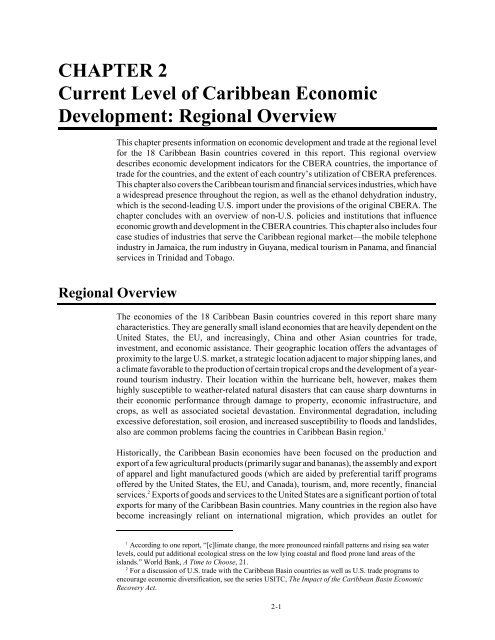Caribbean Region: Review of Economic Growth and ... - USITC
Caribbean Region: Review of Economic Growth and ... - USITC
Caribbean Region: Review of Economic Growth and ... - USITC
Create successful ePaper yourself
Turn your PDF publications into a flip-book with our unique Google optimized e-Paper software.
CHAPTER 2Current Level <strong>of</strong> <strong>Caribbean</strong> <strong>Economic</strong>Development: <strong>Region</strong>al OverviewThis chapter presents information on economic development <strong>and</strong> trade at the regional levelfor the 18 <strong>Caribbean</strong> Basin countries covered in this report. This regional overviewdescribes economic development indicators for the CBERA countries, the importance <strong>of</strong>trade for the countries, <strong>and</strong> the extent <strong>of</strong> each country’s utilization <strong>of</strong> CBERA preferences.This chapter also covers the <strong>Caribbean</strong> tourism <strong>and</strong> financial services industries, which havea widespread presence throughout the region, as well as the ethanol dehydration industry,which is the second-leading U.S. import under the provisions <strong>of</strong> the original CBERA. Thechapter concludes with an overview <strong>of</strong> non-U.S. policies <strong>and</strong> institutions that influenceeconomic growth <strong>and</strong> development in the CBERA countries. This chapter also includes fourcase studies <strong>of</strong> industries that serve the <strong>Caribbean</strong> regional market—the mobile telephoneindustry in Jamaica, the rum industry in Guyana, medical tourism in Panama, <strong>and</strong> financialservices in Trinidad <strong>and</strong> Tobago.<strong>Region</strong>al OverviewThe economies <strong>of</strong> the 18 <strong>Caribbean</strong> Basin countries covered in this report share manycharacteristics. They are generally small isl<strong>and</strong> economies that are heavily dependent on theUnited States, the EU, <strong>and</strong> increasingly, China <strong>and</strong> other Asian countries for trade,investment, <strong>and</strong> economic assistance. Their geographic location <strong>of</strong>fers the advantages <strong>of</strong>proximity to the large U.S. market, a strategic location adjacent to major shipping lanes, <strong>and</strong>a climate favorable to the production <strong>of</strong> certain tropical crops <strong>and</strong> the development <strong>of</strong> a yearroundtourism industry. Their location within the hurricane belt, however, makes themhighly susceptible to weather-related natural disasters that can cause sharp downturns intheir economic performance through damage to property, economic infrastructure, <strong>and</strong>crops, as well as associated societal devastation. Environmental degradation, includingexcessive deforestation, soil erosion, <strong>and</strong> increased susceptibility to floods <strong>and</strong> l<strong>and</strong>slides,also are common problems facing the countries in <strong>Caribbean</strong> Basin region. 1Historically, the <strong>Caribbean</strong> Basin economies have been focused on the production <strong>and</strong>export <strong>of</strong> a few agricultural products (primarily sugar <strong>and</strong> bananas), the assembly <strong>and</strong> export<strong>of</strong> apparel <strong>and</strong> light manufactured goods (which are aided by preferential tariff programs<strong>of</strong>fered by the United States, the EU, <strong>and</strong> Canada), tourism, <strong>and</strong>, more recently, financial2services. Exports <strong>of</strong> goods <strong>and</strong> services to the United States are a significant portion <strong>of</strong> totalexports for many <strong>of</strong> the <strong>Caribbean</strong> Basin countries. Many countries in the region also havebecome increasingly reliant on international migration, which provides an outlet for1According to one report, “[c]limate change, the more pronounced rainfall patterns <strong>and</strong> rising sea waterlevels, could put additional ecological stress on the low lying coastal <strong>and</strong> flood prone l<strong>and</strong> areas <strong>of</strong> theisl<strong>and</strong>s.” World Bank, A Time to Choose, 21.2For a discussion <strong>of</strong> U.S. trade with the <strong>Caribbean</strong> Basin countries as well as U.S. trade programs toencourage economic diversification, see the series <strong>USITC</strong>, The Impact <strong>of</strong> the <strong>Caribbean</strong> Basin <strong>Economic</strong>Recovery Act.2-1
















